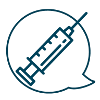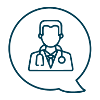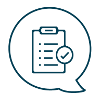Disinformation on the coronavirus is thriving. It is important that you get updated information from authoritative sources only.
We suggest that you follow the advice of your public health authorities, and the websites of relevant EU and international organisations: ECDC and WHO. You can also help by not sharing unverified information that comes from dubious sources.
The fight against disinformation is a joint effort involving all European institutions. The EU is working in close cooperation with online platforms to encourage them to promote authoritative sources, demote content that is fact-checked as false or misleading, and take down illegal content or content that could cause physical harm.
All our efforts to fight disinformation, misinformation and foreign interference have been stepped up and outlined in a Joint Communication by the Commission and the High Representative.
The fight against coronavirus misinformation and disinformation saves lives. The European Commission is deploying all available tools and funding research to help in the fight.
Separating facts from fiction on vaccines
Unsure about some of the stories you read? Here are the facts:

Given the urgency of the current crisis, the EU is taking the necessary steps to ensure that COVID-19 vaccines that conform to EU’s high standards of safety and efficacy are made available to everyone who needs them as soon as possible.
Vaccinations are one of the greatest successes in public health. Worldwide, they save at least 2-3 million lives each year – and many more from crippling and lifelong illnesses. The EU seeks to ensure that only vaccines for COVID-19 that meet the EU’s high standards for safety and efficacy are made available to the public. The Commission reached several Advance Purchase Agreements with vaccine developers and secured enough vaccine doses to vaccinate all EU citizens. All vaccines authorized by the European Commission after an evaluation by the European Medicines Agency will appear on the Safe COVID-19 vaccines for Europeans webpage, where you can also see which vaccines are currently under evaluation by EMA or are being developed.
Vaccines help protect people from harmful diseases. Throughout the coronavirus pandemic, some people have been spreading unscientific anti-vaccine claims. These claims prey on peoples’ fears, potentially causing significant harm to the public health. Misleading information, scientifically unproven theories, and unsubstantiated claims about vaccines modifying DNA or poisoning recipients cause vaccine hesitancy and deter people from being vaccinated.
An unprecedented scientific mobilisation has shown promising results. The coronavirus is exceptionally dangerous and affects our way of life. As such, the global medical research community focused on developing safe and effective vaccines and was able to deliver in record time. Despite this urgency, vaccine candidates are required to go through a rigorous assessment by the European Medicines Agency to ensure that they are effective, safe, and of high quality before being offered to the public. Thanks to a huge mobilisation of resources and expertise at every stage, the development, evaluation and authorization processes have been sped up.
- The EU’s support for vaccinations and #VaccinesWork
- Get the key facts on COVID-19 vaccines from EMA’s website
- Watch microbiologist Peter Piot answer nine common questions on vaccines in 15 seconds
- Stay up to date on the vaccine roll-out with the ECDC’s Vaccine Tracker
- Learn more about the EU’s Coronavirus vaccines strategy
- Check out the European vaccination information portal
- €15.9 billion Coronavirus Global Response

The EU Digital COVID Certificate is enabling all Europeans to travel safely in the EU and abroad, for work or for holiday.
The European Commission presented a legislative proposal for an EU Digital COVID Certificate, which provides proof that a person has been vaccinated against COVID-19, has received a negative test result, or has recovered from COVID-19. The aim of the certificate is to facilitate the safe and free movement of citizens across EU Member States. It only includes a minimal set of information to confirm the user’s vaccination, testing, or recovery status. The certificate is free of charge and is given as a QR code either digitally or on paper.
The QR code contains a digital signature to protect the certificate against falsification. When the certificate is checked, the QR code is scanned and the signature verified. The European Commission has built a gateway to ensure all certificate signatures can be verified across the EU. The personal data of the certificate holder does not pass through the gateway.
There are many misconceptions regarding the EU Digital COVID Certificate, ranging from conspiracy theories to misinformation on otherwise legitimate concerns and questions. One such claim is that the certificate will be used to restrict travel for people who are not vaccinated, but this is false. One of the core principles of the EU Digital COVID Certificate is non-discrimination: Member States that require proof of vaccination are required to accept, under the same conditions, a negative test result or a certificate of recovery from COVID-19. The certificate does not add further restrictions on or ban travel; instead it only makes travel within the EU easier.
Most importantly, the EU Digital COVID Certificate is a temporary measure. The Commission will suspend this measure as soon as the World Health Organization has declared that the COVID-19 pandemic is over.
- Find out more about the EU Digital COVID Certificate and stay up to date on the latest news
- Read more on the EU gateway, used to verify EU Digital COVID Certificates across borders
- Check out the Q&A on the EU Digital COVID Certificate
- Download the Factsheet on the EU Digital COVID Certificate
- Learn more about the adopted guidelines on proof of vaccination for medical purposes

Vaccine side effects, if any, tend to be very mild and temporary.
Side effects are not a phenomenon exclusive to vaccines. Food and other medicines are also known to cause side effects, some more serious than others, but most of the time we do not experience any. In the rare cases where side effects are experienced, they are almost always minor and do not last very long. This also applies to vaccines against COVID-19. The most common side effects of any vaccination include mild and temporary pain or swelling at the injection site, tiredness, chills, nausea, vomiting, and fever. Less than 1 in 10 people might experience a rash, hives, or redness at the site of injection. Itching at the site of injection occurs even more infrequently in 1 in 100 people. A full list of potential side effects is publicly available for the vaccines developed by BioNTech-Pfizer, Moderna, AstraZeneca, and Janssen and you can also consult your doctor for more information.
While every suspected case of serious side effects in response to a COVID-19 vaccination should be taken seriously, you should also be careful about jumping to conclusions. Even if a symptom is experienced shortly after vaccination, this does not automatically mean that it was caused by the vaccination itself; the causes behind it could be unrelated and their timing an unfortunate coincidence. The only way to know for sure whether a side effect was caused by the vaccination is to wait until healthcare professionals have carefully examined all vaccine recipients and separated the actual cases of side effects from the unrelated cases.
If you feel like you are experiencing adverse side effects after receiving a vaccine against COVID-19, please report this to you doctor.

Patients participating in clinical trials for vaccines against COVID-19 represent the population that will use the vaccines if authorized.
The EU’s high standards for safety and efficacy demand that any new vaccine, such as vaccines against COVID-19, passes rigorous clinical trials. The manufacturer must then submit the data from those clinical trials to the European Medicines Agency, which then reviews this data and decides whether to recommend its use to the European Commission. One of the factors that the European Medicines Agency examines is the group of patients tested during the clinical trials. In order for clinical trials to verify whether a vaccine against COVID-19 is safe and effective, the participants of the trials must represent the population that will be vaccinated if the vaccine is to be approved. As such, a very diverse group of participants have taken part in clinical trials (different ethnicities, ages, and genders). Participants in the clinical trials also represented high-risk groups, and the results showed that there were high levels of safety and efficacy maintained across all groups.
A lot of misinformation has also been directed at the suspected side effects of the vaccine on pregnant women. It is true that data on the use COVID-19 vaccines during pregnancy is very limited, because they tend not to participate in studies, since pregnancy affects pregnant women’s immune systems. However, studies in animals found that there were no harmful effects during pregnancy and experts do not anticipate any adverse side effects. Even so, the decision on whether to vaccinate a pregnant woman should be made during a close consultation with a healthcare professional after considering the benefits and risks. Vaccine manufacturers will continue to closely monitor vaccine recipients to ensure their long-term efficacy and safety.
- Find out more about the EU Clinical Trial Regulation
- Read more about the clinical trial patients from the EMA public stakeholder meeting on safe and effective COVID-19 vaccines
- Find out more about EMA’s guidance for medicine developers and other stakeholders on COVID-19
- Check out the information on the clinical trial participants for the vaccines developed by BioNTech-Pfizer, Moderna, AstraZeneca, and Janssen

Natural immunity to COVID-19 after infection is temporary and people who were previously infected should still get vaccinated after consulting with their doctor.
The available scientific evidence on natural immunity to COVID-19 after a confirmed infection shows that it does last not very long – most estimates show that someone who was infected and recovered from COVID-19 has natural immunity for roughly six to eight months. Be cautious when reading unverified claims about natural immunity to COVID-19 after infection and continue to follow measures to protect yourself from possible re-infection: keep distances from other people, wear a facemask, and wash your hands frequently. If you did recently recover from COVID-19, you should consult with your doctor or local health officials on when you should receive your vaccine.

Vaccinations are happening as fast as the worldwide production capacity allows.
Vaccination rates in EU countries depend on many factors, one of which is the vaccine production and the distribution from manufacturers to the EU countries. Knowing this, in the early stages of the pandemic, the European Commission offered vaccine developers financial support to help them increase their production capacities, in exchange for their commitment to deliver billions of vaccine doses. The Commission has authorised contracts with several different vaccine manufacturers, ordering 2.3 billion doses of future vaccines to maximise the chances of getting the best vaccine or vaccines. The EU bought vaccine doses as early as was offered by vaccine manufacturers.
The first vaccine doses were delivered to the EU countries in advance of the European Vaccination Days on 27-29 December 2020, but the distribution of the vaccines from that point on depends on the national and regional organizations and their level of preparedness.

Health policies are in the hands of Member States. The Commission coordinates cross-border issues and provides support.
The European Commission supports European countries and helps coordinate efforts in times of crisis. By increasing coordination among European countries, strengthening our medical and scientific agencies, and launching initiatives like the Pharmaceutical Strategy for Europe, the Commission is preparing for future cross-border health crises. In the realm of health, the primary competence will always fall on the Member States, who are responsible for their own policies.

Vaccines for COVID-19 go through several rounds of rigorous testing and peer review before they are approved.
The vaccine approval process is both meticulous and transparent. COVID-19 vaccines have to go through three stages of clinical trials and meet high standards before the European Medicines Agency (EMA) gives a positive scientific recommendation and the European Commission authorizes them for public use, just like any other vaccine. The pharmaceutical companies carry out these clinical trials, following standards set in place by EMA to verify the effects of the medicines being tested and to protect the well-being of the trial subjects. Furthermore, all clinical trials are registered in the EUClinical Trials (EudraCT) database, where information on clinical trials is made publically available. The process is transparent because anyone can access the data.
The vaccine development process has been made much more efficient (without compromising on efficacy and health standards) by running clinical trials in parallel, with more volunteers than usual, and by allocating more resources to researchers. The process was also made more efficient by allowing vaccine developers to submit their trial results to EMA on a rolling basis throughout the research and development stage. Normally, clinical trial data was only submitted for review after the research and development stage was complete. EMA therefore needs less time to give its opinion on the vaccine after the developer applies for the marketing authorisation, because the bulk of the evaluation has already taken place. Quality is not sacrificed for the sake of expediency.
- Find out more about EMA’s vaccine trial regulations
- More information on the approval of vaccines in the EU
- Stay up to date on the timeline of all the vaccine trials on EMA’s website
- Find out more from EMA’s public stakeholder meeting on the development and authorisation of safe and effective COVID-19 vaccines in the EU

Covid-19 vaccines, like any other type of vaccine, teach your immune system how to protect itself from the virus you are vaccinating against.
Vaccines work by introducing a small, dead portion of the harmful virus so that our bodies can generate immunity to it, without causing an infection. This protects us from potential future infections of the actual virus.
The cells in our body read the genetic code - our DNA – and create temporary genetic instructions – in the form of RNA – which tell the body how to produce the proteins they need to grow and repair. Once the proteins are created, the RNA is degraded. The vaccines made by Pfizer-BioNTech and Moderna identified the specific protein (the spike protein) which allows the coronavirus to infect healthy cells in humans. Their vaccines give cells a modified RNA - mRNA - that instructs them to produce that spike protein, without the rest of the virus. Our bodies then have an immune response to the spike protein, which can take a long time when the body is first exposed to it. Through this the process, our body learns how to identify that protein after vaccination and can recall and produce the antibodies it needs to eliminate it much faster in the future, the event of an actual infection.
There is no evidence that this process can damage our own cells.
- Check out the key facts about COVID-19 vaccines
- Microbiologist Peter Piot explains how vaccines work in 15 seconds
- Find out more on about how vaccines work on the European Vaccination Information Portal
- Watch EMA’s public stakeholder meeting on the development and authorisation of safe and effective COVID-19 vaccines in the EU

Pharmaceutical companies are liable for side effects of vaccines purchased under the EU Vaccines Strategy
Product liability always belongs to the company that holds the marketing authorisation. Companies are responsible for the safety of their products, and have specific obligations, such as the obligations to implement a full risk-monitoring plan, to report any adverse effects of the product, and to take necessary follow-up actions. It is true that the EU has adjusted some of the rules around vaccines in order to deliver a safe and effective vaccine in a shorter timeline. However, the rules on the safety standards are just as strict as they have always been and the Product Liability Directive still holds. In other words, claims that the contracts the Commission has negotiated would not hold the vaccine manufacturers liable for any side effects are simply false.
The safety and effectiveness of authorised COVID-19 vaccines will be rigorously monitored through the EU’s established medicines monitoring system. To what extent a new vaccine succeeds in triggering long-term effects cannot be confirmed until enough time has passed. Often, because the timing of an unexpected medical condition coincided with receiving a vaccine, people assume the vaccine caused the unexpected medical condition. Newly approved vaccines against COVID-19 will continually monitored to get a better understanding if suspected side effects are actually caused by the vaccine or if they are unrelated, as well as for their long-term efficacy. The vaccine manufacturers will continue to be liable and be expected to monitor the long-term effects of their vaccines long after they have been administered.

If there is enough reliable evidence to show that a COVID-19 vaccine meets the EU’s high standards for safety and effectiveness, the EU will recommend its use, no matter who manufactured it.
Pro-Kremlin disinformation has been claiming that the EU is undermining the efforts of other countries. Marketing vaccines in the Internal Market requires high European standards for safety and efficacy set by the European Medicines Agency. Currently, the Russian Sputnik V vaccine against COVID-19 is under a rolling review by the European Medicines Agency, whose recommendation will determine whether or not the European Commission authorizes the vaccine for use in the EU.
Moreover, there is a long history of Kremlin-backed disinformation campaigns in Europe and abroad, which has been well documented by EUvsDisinfo. For example, pro-Kremlin actors were found promoting the Sputnik V vaccine in Latin America, while attempting to undermine other vaccines.
At the end of the day, the EU would be willing to use a vaccine from anywhere in the world, but it would need to pass the high European standards for safety and efficacy set by the European Medicines Agency.
- Find out how the EU is making sure vaccines are safe
- Find out more about how the EMA evaluates and approves new vaccines
- Find out more about pro-Kremlin disinformation on vaccines
Separating Facts from Fiction on COVID-19
Unsure about some of the stories you read? Here are the facts:

Most scientists and policy makers agree that lockdowns save lives, but also that they are not a feasible long-term option to address the pandemic.
The EU and all its Member States will always put people’s health and livelihoods first. Throughout the pandemic, most countries across Europe were forced to implement temporary lockdown measures to manage the high number of new cases. It is in everyone’s interest to keep the lockdowns as short as possible whenever they are implemented, but this is only possible if they have the desired effect: significantly reducing the number of new infections. Stopping the spread of the coronavirus also depends on how well people follow coronavirus guidelines, such as mask wearing in public and social distancing.
Policy-makers and scientists are aware that lockdowns are costly and not a feasible long-term option as they disproportionately affect the poor, families with young children, and workers who cannot work from home. They place a heavy burden on the economy, and are detrimental to people’s mental health and well-being. Temporary lockdown measures are necessary in some situations to give health-care services enough time to get the situation under control and avoid the worst-case scenario.
As the coronavirus spreads through contact with liquid droplets and longer-range transmission via aerosols, especially in conditions where ventilation is poor, limiting contact between people is the most reliable way to break infection chains. Allowing the coronavirus to continue spreading uncontrolled would eventually overwhelm the health-care services, which could lead to higher mortality rates.
- Find out about the current lockdown measure on ReOpen EU
- Find out about the scientific consensus on COVID-19 measures
- Read about the WHO’s position on lockdown measures

Be wary of people online claiming they have found a “miracle cure”
Following medical advice from unfamiliar or unreliable sources could endanger your health. Remember that the vaccines authorized for use by the European Commission will appear on the dedicated webpage for Safe COVID-19 vaccines. The vaccines listed there were approved after a careful evaluation by the European Medicines Agency, which is currently also reviewing vaccines made by other pharmaceutical companies. You should be skeptical about anyone claiming that they have a coronavirus treatment that has not been approved by the European Medicine’s Agency or that has not been recommended to you by your national health authorities. If you would not trust it normally, do not trust it now!
Think twice before sharing any information that you see on social media about treatments and be sure to crosscheck information on new developments with trusted sources. One such example is the discussion around Hydroxychloroquine (a drug used to prevent and treat malaria), which has received a lot of attention, despite evidence from controlled studies so far showing that the drug is ineffective against the coronavirus. Do not self-administer this drug or any other “miracle cure”. You can stay up to date on all the potential Covid-19 treatments and medicines on European Medicines Agency’s website.

The coronavirus can only spread from one person to another through droplets that people sneeze, cough or exhale, not via mobile networks.
A very common myth perpetuated online is that the roll-out of 5G networks is behind the coronavirus pandemic. This is false. Conspiracy theories incorrectly linking 5G and the coronavirus pandemic are conflating the two, possibly because they are both relatively new and invisible to the human eye. 5G is simply the next generation of mobile networks and, like the current 4G networks, cannot interact with a virus. 5G uses radio waves to connect different devices and is not a vector for the coronavirus, which only survives in liquid droplets. Even more damning evidence against this myth is that the coronavirus has spread around the world, while 5G networks have not yet been deployed everywhere. Many countries that do not have any 5G networks have had large coronavirus outbreaks. There is simply no correlation between the coronavirus and 5G networks.
Protecting people is the top priority of the EU, which is why EU exposure limits follow the “better safe than sorry” approach. In fact, EU exposure limits for the general public, including for 5G, are 50 times lower than what (according the available scientific evidence) might have an impact on people’s health. All 5G installations have to meet these incredibly high standards before being allowed to operate. If there was no way to use 5G without endangering the health and wellbeing of people in Europe, the EU would not have recommended its use and Member States would have banned it.

The EU has a coordinated plan for Europe's recovery, by supporting people and businesses while continuing to address health concerns.
The EU is focusing its efforts on restarting economic activity and building a fairer, greener, more digital Europe. The Recovery Plan, with its overall budget of €1.8 trillion, will help Europe recover from the crisis and support multiple European sectors coming out of lockdown. This includes major programmes like NextGenerationEU, which will ensure that the recovery is sustainable, inclusive and fair for everyone – including those in rural areas and those who were hit hard by the crisis. The NextGenerationEU instrument, which was created with input of all Member States, will increase economic activity across the EU. Receiving funds will be conditional on enacting economic reforms, but without imposing austerity measures.
The EU is also keen on ensuring that citizens can continue traveling in Europe without putting themselves at risk of catching the virus. Re-open EU, the web platform originally launched to help Europeans travel during the coronavirus pandemic, has been turned into a one-stop-shop for information about the state of health measures, restrictions and travel possibilities across the EU. The EU and the Member States are prioritising people’s safety and well-being.

There is no conspiracy behind the global effort to stop the pandemic - scientists seek vaccines for all
If a theory presents you with a very convenient scapegoat that you can blame for all our problems, you should think twice before trusting it. Generally, conspiracy theories are captivating because they present you with overly simplistic and straightforward answers to complex questions. They have predictable formats and focus on a clear and easily identifiable ‘enemy’. They follow formulaic, predictable blueprints that are replicated in various scenarios, only changing to focus on different actors. Do not let these overly simplistic and false solutions to this complex health crisis fool you.
One such theory claims – with no credible evidence to support it - that Bill Gates is the creator of the coronavirus as a part of some nefarious scheme. This is obviously not true. The Bill and Melinda Gates Foundation has a long history of fighting to eradicate dangerous diseases around the world, like polio. In order to overcome the coronavirus, the Foundation has donated $125 million towards the independent, collective international effort to develop and deploy coronavirus diagnostics, therapies, and vaccines. The foundation also actively contributed to and supported the Coronavirus Global Response pledging marathon initiated by the European Commission on 4 May, which registered €15,9 billion in pledges from donors to help fund the development and universal deployment of diagnostics, treatments and vaccines against the coronavirus. Of course, any coronavirus vaccine will have to go through rigorous clinical trials before being approved.
- Read more about the coronavirus global response
- Read more about the Bill and Melinda Gates Foundation’s donation towards the development a vaccine
- Learn more about the EU’s Coronavirus vaccines strategy
- Check out the European vaccination information portal

The EU has some of the strongest data protection and privacy rules in the world. The coronavirus pandemic does not change that.
Digital technologies can protect and save lives. For example, the voluntary use of coronavirus tracing and warning apps can play a key role in all phases of the crisis and, particularly during a resurgence of new cases, complement other measures like increased testing. Such apps can help stop the virus from spreading by breaking infection chains and alerting users who have come into close proximity with an infected person. All coronavirus contact-tracing apps must voluntarily, transparent, secure, work across borders, and fully respect people's privacy.
In order to facilitate the proper functioning of contact tracing apps, the Commission is hosting an interoperability gateway: a digital infrastructure needed to ensure national app servers can communicate information between them. This solution, covering the vast majority of tracing apps launched in the EU, will support both business travelers and tourists travel safely through Europe while the pandemic is still ongoing.
- Visit the Commission’s webpage on COVID-19 tracing and warning apps
- Discover the EU’s common approach to safe and efficient mobile tracing apps
- Read more about the ECDC’s recommendations on contact tracing apps

Facemasks help keep you healthy, are completely safe, and should be used and disposed of properly.
We all want to protect ourselves from the coronavirus, and facemasks can help to keep us safe and healthy during this pandemic if used correctly. They can severely limit the spread of the coronavirus, especially in enclosed spaces. If you are infected you might not experience any symptoms, in which case a facemask can protect others.
Masks are complemented by other preventive techniques, like washing hands and social distancing, and cannot on their own guarantee full protection. They need to be worn and removed correctly. The proper use of a facemask itself does not lead to conditions like hypoxia (oxygen deprivation) or hypercapnia (carbon dioxide poisoning). The EU ensures that masks distributed through EU support mechanisms are of sufficient quality through tests before delivery.

The coronavirus can infect and develop complications for anyone, even if they are in a low-risk group.
Every generation of Europeans has faced a big challenge or a threat – our generation’s challenge is the coronavirus. What makes the coronavirus such a threat is how infectious it is. Anyone can be infected and this can lead to severe complications, even among the otherwise young and healthy.
The EU has responded by prioritising the protection of lives and livelihoods, working closely with Member States to coordinate and share information, as well as using every tool at its disposal to slow down the spread and to find solutions. We currently do not know how the pandemic will develop in the future, but we have to be prepared for any possibility.
Both the youth and the elderly are at risk when ignoring official advice. Moreover, we still do not know what the long-term effects of the virus are. Scientific research is still on going and we simply do not know enough about the virus to assess how much damage it can do. What we do know is that anyone could suffer from it.
Everyone has a role to play in fighting the virus. It includes washing your hands thoroughly, avoiding touching your face and respecting social distancing in public spaces, as well as isolating if you have the symptoms.

The lockdown measures across Europe are temporary and do not signal the end of democracy or European values.
Respecting social distancing and following COVID-19 guidelines saves lives and stems the spread of the coronavirus. These measures are based on the latest scientific evidence and data available to decision-makers in each Member State. National governments and the Commission are also aware of the mental and economic toll these lockdowns have on the population, and are committed to getting the virus under control and reopening the EU as quickly as possible.
Fundamental European values such as the freedom of movement and expression are integral to the EU's model and way of life, and these areas are more important than ever in this time of crisis. Lockdown measures do not signal an end or compromise on these values, but are necessary to deal with the rapid increase in new cases of Covid-19 seen during the pandemic. Each time the number of new cases falls down to acceptable level, temporary restrictions are lifted and Europeans are be able to resume their normal movements. These measures are only implemented my Member States in response to extremely dire situations. The EU is committed to ensuring that these values are upheld across the Union throughout this difficult period and beyond.

Further investigations are needed to confirm the origin of COVID-19 pandemic.
It is more important than ever to work together in solidarity with countries across the globe to fight the coronavirus. Disinformation and baseless accusations over the origin of the coronavirus can easily damage vital international support networks and put lives at risk. The EU supports the global efforts to identify the origins of the pandemic, such as the World Health Organization (WHO) Global Study of Origins of Coronavirus.
The COVID-19 disease is caused by a strain of coronavirus (which is itself a type of virus) called Sars-CoV-2, and was reported to the World Health Organisation on 31 December 2019 in Wuhan, China. Coronaviruses cause respiratory illnesses and can be transmitted from animals to humans. We do not know with absolute certainty where the virus originated. However, the WHO Global Study of Origins of Coronavirus states that it is possible to likely that COVID-19 originated as a result of a direct zoonotic spillover. On the other hand, based on the available evidence, a laboratory accident at the Wuhan Institute of Virology has been classified as extremely unlikely. Nevertheless, further investigations are needed to confirm the origins of COVID-19, without excluding any possibilities.
Important and necessary questions must be asked about the reporting and handling of the outbreak, but baselessly blaming others for this disease will not make the current situation better – only together can Europe, and the world, overcome the coronavirus pandemic. Global health is a common responsibility for all. Every omission or delay in sharing public health information can have a worldwide adverse impact.

While the EU works cooperatively and constructively with its neighbours, we will always disclose harmful disinformation and its sources.
Disinformation hurts our ability to make good decisions by overwhelming you with conflicting information, confusing you and making you unsure. The consequences can be serious – it can even threaten people’s safety, damage trust in governments and media, undermining our global role. We are particularly vulnerable to disinformation in moments of stress – and some people are using the coronavirus pandemic to strike when we are at our most vulnerable.
Analysts at EUvsDisinfo find that false information and claims are being actively spread around the world to spread confusion and mistrust around Europe’s response to the coronavirus. Foreign actors including third countries, in particular in Russia and China, have engaged in targeted influence operations and disinformation campaigns around the coronavirus in the EU, its neighbourhood and globally, seeking to undermine democratic debate and exacerbate social polarisation, and improve their own image in the coronavirus context. The best response is to call out these attempts, identify those responsible and tell the truth ourselves early and often. The European Commission, the European Parliament and the European External Action Service work to identify and raise awareness about the spread of disinformation on the virus.

Viruses do not care about where you are from. They do not care about your ethnicity or which passport you hold.
In different parts of the world, people are trying to blame the coronavirus on different groups – calling it the European virus, the Chinese virus, the British virus, or the American virus. The fact is that this is a virus that spreads from one infected person to another through droplets that people sneeze, cough or exhale, and is not carried by any particular population or group. If you read that migrants or specific ethnic groups are purposefully spreading the virus, be assured that there is no scientific basis to such claims. In fact, the coronavirus represents a global crisis that requires global solidarity.

The EU supports Member States’ investments in public health
The EU supports solid investment in public health and the EU fiscal rules have never required cuts in this area. In Europe, people and their health come first and public spending on healthcare has increased in most EU states over the past decade. It is a policy that has consistently been distinctive to the European Union across the world. The EU recently launched a plan to support countries through the crisis, adjusting rules so that countries can spend more on emergency services and focus on what matters most – protecting people.
This is not new either – since the financial crash of 2008, the EU has put multiple financial initiatives in place to support all Member States – particularly in those most adversely affected by the crisis, such as Greece, Spain and Italy. Countries like Greece did not see their healthcare systems damaged by these reforms – on the contrary, the EU Stability Support Programme has helped reinforce universal healthcare coverage and a comprehensive healthcare system. As well as supporting small businesses, research and innovation and climate-related projects, the Investment Plan has helped finance a large number of projects in the health sector, such as developing new cancer treatments and expanding and modernising hospitals. The Commission also tabled the EU4Health programme to reinforce the EU’s actions against pandemics. The programme is expected to have a budget of €5.1 billion, which will provide funding for EU countries, health organisations and NGOs.

The EU is taking care of the things it is responsible for so governments can stay focused on their priorities.
The ability to pass national laws and take decisions to tackle the coronavirus rests entirely with Member States and some regions within Member States. The European Commission does not have a right to interfere in national legislation and decisions on subjects such as health. On the other hand, the EU can put together European policies and coordinate pan-European initiatives to tackle the crisis together with Member States. An example of this is that the decision to go into ‘lockdown’ and to close a country’s borders is made on a national level, whilst the mobilisation of over €100 million to find a vaccine, new treatments and diagnostic tests is made on an EU level from the EU research and innovation programme, Horizon 2020. This joined the Commission's current €15.9 billion pledge to the Coronavirus Global Response initiative, launched by President von der Leyen on 4 May.
Online bots are spreading disinformation on the coronavirus crisis across Europe.
The massive increase of online disinformation and outright fake news concerning the coronavirus makes it very difficult to tell what is true and what is false. Some of the misleading information, massively spread via fake social media accounts including ‘bots’ that run automated tasks on the internet and social media, can potentially be very harmful to you and your loved ones. Fake news relies on being perceived as believable, and therefore good to share, which makes it even more dangerous. Think twice before you share content on your personal social media platforms. Remember, information should only be taken from reliable and trusted sources: if you would not trust the information or the news source normally, do not trust it or share it!
The EU is working with online platforms to address the issue of fake accounts and bots – many of which have been taken down already. In this time of crisis, our fears and heightened tensions means fake accounts and bots are a dangerous online presence now more than ever. You can spot fake news by following these three simple steps:
- Check the source. Are you being deceived by fake sources?
- Check the story. Is it covered by more than one news source?
- Check the intention. Has the story been pushed by bots?
Reporting disinformation and misinformation to platforms
False and misleading information circulating online about vaccines against COVID-19 threatens our ability to recover from the pandemic. Disinformation and misinformation about vaccines decreases people’s confidence in medical science and healthcare professionals. It is therefore crucial for everyone to do their part and get the facts right.
You can help curb the spread of misinformation by reporting online content you believe is false or misleading. To help you do this, the WHO created a webpage showing you how to report false or misleading content on social media platforms.
Identifying conspiracy theories
The coronavirus outbreak has been accompanied by waves of dangerous conspiracy theories, spreading mostly online. These theories present pernicious, far-fetched explanations on where the virus might have originated and on who is to blame for its spread. As part of the comprehensive approach to tackle the negative impact of conspiracy theories, the European Commission and UNESCO are publishing a set of accessible educational infographics with the aim to help citizens identify – and counter – conspiracy theories.
Beware of online scams
Beware of online scams related to products that claim they can cure or prevent COVID-19 infections. Rogue traders may advertise or attempt to sell products such as protective masks or hand sanitizers which allegedly can prevent or cure an infection but these products may be fake and you might be scammed. You can find advice here that can help you detect and avoid potential scams.
On 2 March 2021, the Commission published its annual report on the Safety Gate, the EU rapid alert system for dangerous consumer products helping remove dangerous non-food products from the market.
Online resources and tools
Discover a selection of online resources and tools for learners, teachers and educators during the outbreak of COVID-19.
Read our Medium post on the 5 useful things to know about the coronavirus.
